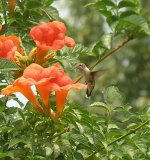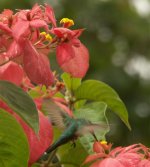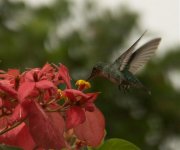Hello,
Here's a dumb question, but am new at this, and just put up a feeder, and guess what - have actually attracted them !!
So, I was wondering:
What actually attracts them ?
It certainly isn't any aroma from the sugar water, I would imagine.
The feeder, like most of them, is really a pretty poor imitation of flowers and nector sources, at least in my opinion.
What do they actually home in on ?
I can't imagine what actually attracts them to the feeder.
BTW: what's the probability of the same one(s) coming back to the feeder for their southern migration ? And, the same one(s) for next Spring's northern trip ?
Thanks,
Bob (outside of Boston)
Here's a dumb question, but am new at this, and just put up a feeder, and guess what - have actually attracted them !!
So, I was wondering:
What actually attracts them ?
It certainly isn't any aroma from the sugar water, I would imagine.
The feeder, like most of them, is really a pretty poor imitation of flowers and nector sources, at least in my opinion.
What do they actually home in on ?
I can't imagine what actually attracts them to the feeder.
BTW: what's the probability of the same one(s) coming back to the feeder for their southern migration ? And, the same one(s) for next Spring's northern trip ?
Thanks,
Bob (outside of Boston)







